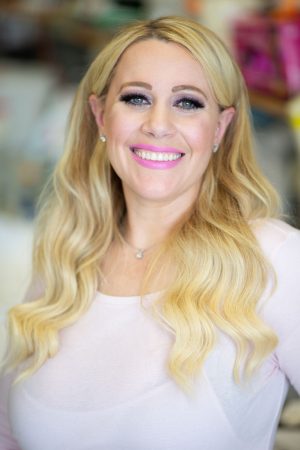
August 23, 2021
LA JOLLA—Professor Janelle Ayres has been recognized for her contributions and dedication to advancing science through research by being named the inaugural recipient of the Salk Institute Legacy Chair, effective July 1, 2021.

Elizabeth Keadle, a Salk alumna and member of the Board of Trustees, recently donated $1.5 million in matching funds to establish the endowed chair at the Institute.
“It is a privilege to have Janelle Ayres as the inaugural holder of this Chair. Her cutting-edge research on disease tolerance and the ‘Cooperative Defense System’ is a powerful new approach to some of medicine’s most persistent challenges—many of which have been illuminated during the ongoing pandemic,” says Keadle. “Dr. Ayres’ research, including collaborations across multiple disciplines, exemplifies the excellence inspired by the legacy of the Salk and embodies the spirit of this Chair.”
Ayres, head of the Molecular and Systems Physiology Laboratory and a member of both the Gene Expression Laboratory and the NOMIS Center for Immunobiology and Microbial Pathogenesis, is upending our understanding of how to fight disease. The longstanding assumption for biomedical researchers is that health is the absence of disease, and that to be healthy one must simply remove the primary source of the disease. Through her pioneering work on host-pathogen interactions, Ayres has demonstrated that health is an active process, involving evolved physiological defense mechanisms, creating a new paradigm and field that she calls “the biology of health.” At its core is Ayres’ discovery of the “Cooperative Defense System,” which has challenged the long-standing notion that, in order to survive infections, the host needs to kill the pathogen. The Cooperative Defense System encodes disease-tolerance mechanisms that promote health and survival by providing a physiological defense and without killing the pathogen. The discoveries made by Ayres and her research team have obvious therapeutic implications for infectious diseases, with the potential to extend to non-infectious diseases. Ayres’ discoveries also provide the foundation for the conceptual framework and theory she developed for our understanding of the biology of health, which she hopes will serve as a roadmap for biomedical research for decades to come. In a recent paper published by Ayres (“The Biology of Physiological Health”), she outlines her conceptual framework and makes a call to action for researchers to shift their focus from solely understanding disease pathogenesis, to understanding the mechanisms of health. According to Ayres, once we understand health mechanistically, we will be better able to treat disease. Her work has proven to be highly influential, as indicated by research groups at Salk and beyond that have integrated her concepts into their programs.
“Our current times are a sobering reminder that we cannot be complacent about the challenges infectious diseases impose on us. Understanding the basis for the variation in patient susceptibility to a pathogen and the disease tolerance mechanisms that promote the endurance of asymptomatic individuals is necessary for our ability to defend against existing infectious diseases and emerging pathogens of pandemic potential,” says Ayres. “I’m very grateful for Liz Keadle’s and Salk’s support and recognition of my work in this critical area, as well as my contributions for understanding the biology of health generally.”
Ayres’ recent track record of achievements includes a $1.8 million award by the NOMIS Foundation and the NIH Director’s Pioneer Award in 2018. In 2018, she was one of three recipients of the Blavatnik National Award for Young Scientists, one of the world’s largest unrestricted prizes for early career scientists.
“Janelle’s groundbreaking work in host-microbe interactions offers valuable insight into a wide array of diseases,” says Salk President Rusty Gage. “The Salk Institute Legacy Chair is a well-deserved honor given her research to advance human health, and we are thrilled Liz came forward to match existing funds, providing Salk with a much-needed senior scientist endowed chair.”
Office of Communications
Tel: (858) 453-4100
press@salk.edu
Unlocking the secrets of life itself is the driving force behind the Salk Institute. Our team of world-class, award-winning scientists pushes the boundaries of knowledge in areas such as neuroscience, cancer research, aging, immunobiology, plant biology, computational biology and more. Founded by Jonas Salk, developer of the first safe and effective polio vaccine, the Institute is an independent, nonprofit research organization and architectural landmark: small by choice, intimate by nature, and fearless in the face of any challenge.